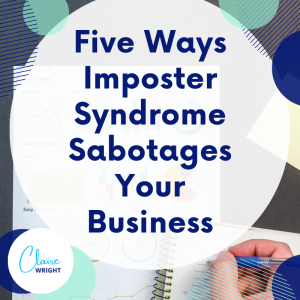The mindset of a solopreneur has a huge impact on the day-to-day running of your business and the long-term growth of your business. If you regularly experience those questions of ‘who am I to…?’ or ‘why would people work with you?’ then it’s likely that imposter syndrome is sabotaging your business or at least aspects of it.
So here are five more ways that you can spot where imposter syndrome is sabotaging your business growth. And some tips on how to start addressing them. Remember awareness is the first step in making a change, we aren’t here to judge.
1. Disregarding Skills & Experience
When was the last time you gave yourself a performance review? Or inventoried the skills, experiences, gifts, talents, attributes, abilities or capabilities you bring to your current service or creation? I’m going to guess never or not for a while. Having an accurate and objective picture of what you bring not only helps us to see where we can improve but also can show how we bring value to our services.
The best way to address the imposter questions ‘who are you to…?’ and ‘why would people buy from you?’ is to answer them. Write out a list of your experience, of the reasons you are able to help people, of the ways you can help people and what you bring to the table. I challenge you to fill a sheet of A4 paper and to be creative. There are so many skills and experiences you already have that are valuable.
2. Chasing Qualifications
Closely related to overlooking your skills and experience is thinking you need another qualification or modality to succeed. This is a classic way that imposter syndrome is sabotaging your business! Knowledge isn’t a bad thing, but putting it between you and success isn’t helpful. I’m fairly sure you can help people now.
Not everyone needs a thrice degree educated Chief Financial Officer with five professional charterships and a Doctorate in the Economics of Monetary Based Markets. More often we need someone to explain things in a way & language we understand, at a level we understand. We need to see the next few steps, for them to feel achievable. Not every step in the process.
I’m not suggesting you claim affiliations or qualifications you don’t have. Instead, use what you already know to help those who need what you already know.
3. Comparison
I think comparing ourselves to others is a driving factor in thinking we need to know more and/or have more qualifications. And I think comparing ourselves to others is totally natural and even insightful. You can see what you might want to improve over time, what people with similar experiences have achieved and what is possible. But use it for inspiration, not self-judgement.
We need to remember that each of us is on our own path, it may seem like that person has what you want, but it’s a business based on their skills, experience, qualifications and desires. Not yours. It’s based on their audience, ideal client, specialism and mindset. Not yours.
4. Following Up
If you’re a service-based business it’s likely you’ll have people express an interest in working with you but not purchase immediately. These contacts or leads could become clients IF you stay in touch with them. But so many business owners don’t ‘follow up’ because their imposter syndrome questions their value, integrity and make it feels awkward or ‘salesy’ so we resist and avoid it.
Checking in with past and potential clients can be a service when done with a genuine intention. They had an issue that you could help them resolve and they were interested in the outcomes you offer. Your follow-ups can be reminders and accountability to keep them working on the outcome, with or without your help. If you respect when people close the conversation, keep the conversation about them and don’t turn into a spam fest, then you can be genuine and connected.
5. Spending
Imposter syndrome can impact your business [and personal] spending in two ways. You either spend in an effort to make yourself feel like a proper business owner, all subscriptions and softwares, all the courses and training, all the support, etc. Or you don’t spend at all because you aren’t a proper business owner, this isn’t a proper business, so spending is ridiculous, getting help is futile and you should make do. Neither extreme is desirable, though when you are at one extreme the other does seem like the grass is greener.
What is useful is an objective cost and benefit analysis. Consider what will it literally cost in time, energy and money and what else could I use that time, energy and money for? What is the benefit of buying the thing, will it save me time, energy or money and how will buying it help me to progress? What is the cost of NOT buying the thing, how will not getting it hold me back?
My Experience
I have all five of these impacts, symptoms and signs. I held back from helping people with imposter because who am I… and I’ve considered another coaching qualification so many times? Now I see so many other people helping with imposter and visibility and have to avoid comparing. I have check-in Tuesday which happens most weeks with practice. And I’m on the spend less extreme, which reflects my overall money story.
Stop The Sabotage
You don’t have to get them ALL under control to be successful. You don’t have to get ANY of them under control. But you do need to assign the right level of attention to them. Use the insights they offer, adjust if necessary but keep going. Find ways to reassure your imposter that everything will be okay so you can stop self-sabotaging.
If you need help taming the ways that imposter syndrome is sabotaging your business and harnessing the insights that your resistances have to offer then book a free discovery session.
Read the first five ways that imposter impacts your business here.
Watch the Video
Pin for Later


